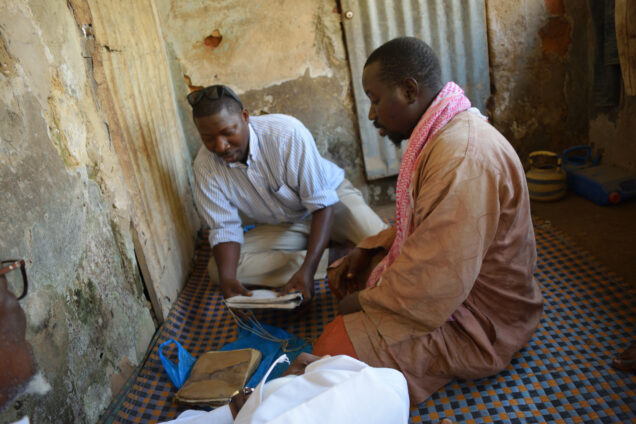New Research Project on ʿAjamī Literature, Literacy and Culture in West Africa
By Daivi Rodima-Taylor
The Boston University African Studies Center has started work on an important scholarly project that provides a new window into the history, cultures, and intellectual traditions of West Africa. The project ʿAjamī Literature and the Expansion of Literacy and Islam: The Case of West Africa that was awarded a NEH Collaborative Research Grant, will digitize a unique selection of manuscripts in ʿAjamī (African language texts written with a modified Arabic script) in four major West African languages – Hausa, Mandinka, Fula, and Wolof, transliterate and translate them into English and French, prepare commentaries, and create related multimedia resources to be made widely available within and beyond the United States.
The ʿAjamī literatures that have developed in sub-Saharan Africa and hold a wealth of knowledge on the history, politics, and cultures of the region, are generally unknown to scholars and the public due to lack of access. This Collaborative Research project between the scholars from institutions in the U.S. and West Africa seeks, through increasing access to primary sources in ʿAjamī, to spark research and scholarly work on this important heritage of Muslim Africa. It brings together a multi-disciplinary team of experts working on different languages and contexts to achieve two interlinked goals: 1) to show the importance of African ʿAjamī traditions by building collections and analyzing representative manuscripts, and 2) to conduct interpretive humanities research that will open up a sustained examination of the ʿAjamī phenomenon in sub-Saharan Africa. Representing the first comparative approach to African languages written in ʿAjamī, this pioneering project seeks to integrate ethnographic fieldwork, interviews, and multi-media formats to illuminate the histories and the educational, cultural, political and religious significance of ʿAjamī in West Africa.

The interdisciplinary and international project team consists of Fallou Ngom (Principal Investigator), Daivi Rodima-Taylor (Project Manager), digital humanities specialists of the Geddes Language Lab from Boston University – Mark Lewis (Director of the Geddes Lab), Shawn Provencal (Director of Programming), Alison Parker (Web Designer) and Frank Antonelli (Video Resources Specialist), and Rebecca Shereikis (Publication Consultant) at ISITA Northwestern University. Language team consultants include Jennifer Yanco, Mustafa Hashim Kurfi, and Garba Zakari for the Hausa digital team; Fallou Ngom, Bala Saho, and Ablaye Diakite for Mandinka team; David Robinson, David Glovsky, and Mouhamadou Lamine Diallo for Fula team; and Fallou Ngom, Ablaye Diakite, and Mouhamadou Lamine Diallo for Wolof team. Our work will be done in collaboration with ISITA at Northwestern University, IFAN (Institut Fondamental d’Afrique Noire), Michigan State University, WARA (West African Research Association), WARC (West African Research Center in Dakar, Senegal) and colleagues from Bayero University and Kaduna Polytechnic in Nigeria. The BU African Studies Center will contribute logistical support.

On June 18th, the project’s core team convened for a planning meeting at the BU African Studies Center, joined via skype by participants from other institutions in the United States and Africa. Attendees included Fallou Ngom, Daivi Rodima-Taylor, Jennifer Yanco, Mark Lewis, Shawn Provencal, Alison Parker Frank Antonelli, Rebecca Shereikis (Northwestern University), Mustafa Kurfi (Hausa digital team), David Glovsky (Michigan State University), and Eric Schmidt and Natasha Patel of BU ASC.
The NEH Collaborative Research Project builds on the pioneering work on ʿAjamī literatures and cultures at the Pardee School of Global Studies of Boston University. A prior project on Wolofal was funded by the British Library’s Endangered Archive Programme. In 2011-12, working with his Senegal based team, prof. Ngom collected and digitized 5,400 pages from 29 manuscripts and 15 collections, deposited at the West African Research Center, the British Library, and Boston University. The current project will also build upon several other earlier projects hosted by Boston University, Northwestern University, and Michigan State University and MATRIX, focusing on ʿAjamī and Islam in West Africa.